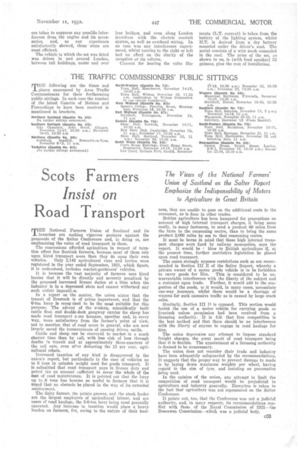Scots Farmers
Page 95

If you've noticed an error in this article please click here to report it so we can fix it.
Insist on
Road Transport
The Views of the National Farmers' Union of Scotland on the Salter Report Emphasize the Indispensability of Motors to Agriculture in Great Britain T"" National Farmers Union of Scotland and its branches are making vigorous protests against the proposals of the Salter Conference and, in doing so, are emphasizing the value of road transport to them.
The concessions afforded agriculture in respect of taxation affect few Scottish farmers, because most of them rely upon hired transport more than they do upon their own vehicles. Only 2,142 agricultural vans and lorries were registered in the year ended September, 1931, which figure, it is understood, includes market-gardeners' vehicles.
It is because the vast majority of farmers uses hired lorries that it will be directly and severely penalized by the proposed increased licence duties at a time when the industry is in a depressed state and cannot withstand any such unfair impositim In a report on the matter, the union states that the transit of livestock is of prime importance, and that the 6-ton lorry is recog tized to be the most suitable for this purpose. The advent of the modern, scientifically built cattle float and double-deck gangway carrier for sheep has made road transport n ore humane, speedier and, in every way, more satisfactory from the farmer's point of view, not to mention that of road users in general, who are now largely saved the inconvenience of passing driven cattle.
Cattle and sheep can be conveyed to market in a much shorter time than by tail, with less risk of loss through deaths in transit and at approximately three-quarters of the rail rate, even after deducting the 15 per cent, agricultural rebate.
Increased taxation of any kind is disapproved in the union's report, but particularly in the case of vehicles up to 6 tons in unladen weight used for goods transport. It is submitted that road transport pays in licence duty and petrol tax an amount sufficient to cover the whole of the cost of road maintenance. It is pointed out that the lorry up to ,6 tone has become so useful to farmers that it is urged that no obstacle be placed in the way of its extended employment.
The dairy farmer, the potato grower, and the stock feeder are the largest employers of agricultural labour, and are users of road haulage, the 5-6-ton lorry being most generally operated. Any increase in taxation would place a heavy burden on farmers, for, owing to the nature of their busi ness, they are unable to pass on the additional costs to the consumer, as is done in other trades.
British agriculture has been hampered for generations on account of high internal transport charges, it being more costly, in many instances, to send a product 60 miles from the farm to the consuming centre, than to bring the same product 2,000 miles by sea to that consuming centre.
It must be borne in mind that these high internal transport charges were fixed by railway monopolies, says the report. It would be • blow to British agriculture if, at the present time, further restrictive legislation be placed upon road transport.
The union strongly opposes restrictions such as are recommended in Section III E of the Salter Report, whereby a private owner of a motor goods vehicle is to be forbidden to carry goods for hire. This is considered to be unwarrantable interference with the liberty of the subject and a restraint upon trade. Further, it would add to the congestion of the roads, is it would, in many cases, necessitate one-way journeys, whilst there would he a shortage of wagons for such excessive traffic as is caused by large stock sales.
Similarly, Section III D is opposed. This section would forbid the use of a motor vehicle for carrying goods or livestock unless permission had been received from a licensing authority. It is felt that free competition is the best method and that there should, be no interference with the liberty of anyone to engage in road haulage for hire.
The union deprecates any attempt to impose standard freight charges, the great merit of road transport being that it is flexible. The appointment of a licensing authority is deemed to be unnecessary.
The union does not consider their trade and industry have been adequately safeguarded by the recommendations. It suggests that the proper way to prevent damage to roads is by laying down maximum weights per wheel, having regard to the size of tyre, and insisting on pneumatics being used.
In the opinion of the union, any attempt to limit the competition of road transport would be prejudicial to agriculture and industry generally. Exception is taken to the fact that agriculture was not represented on the Salter Conference.
It points out, too, that the Conference was not a judicial authority, and, in mary respects, its recommendations conflict with those of the Royal Commission of 1931—the Boseawen Commission—which was a judicial body.




















































































































































